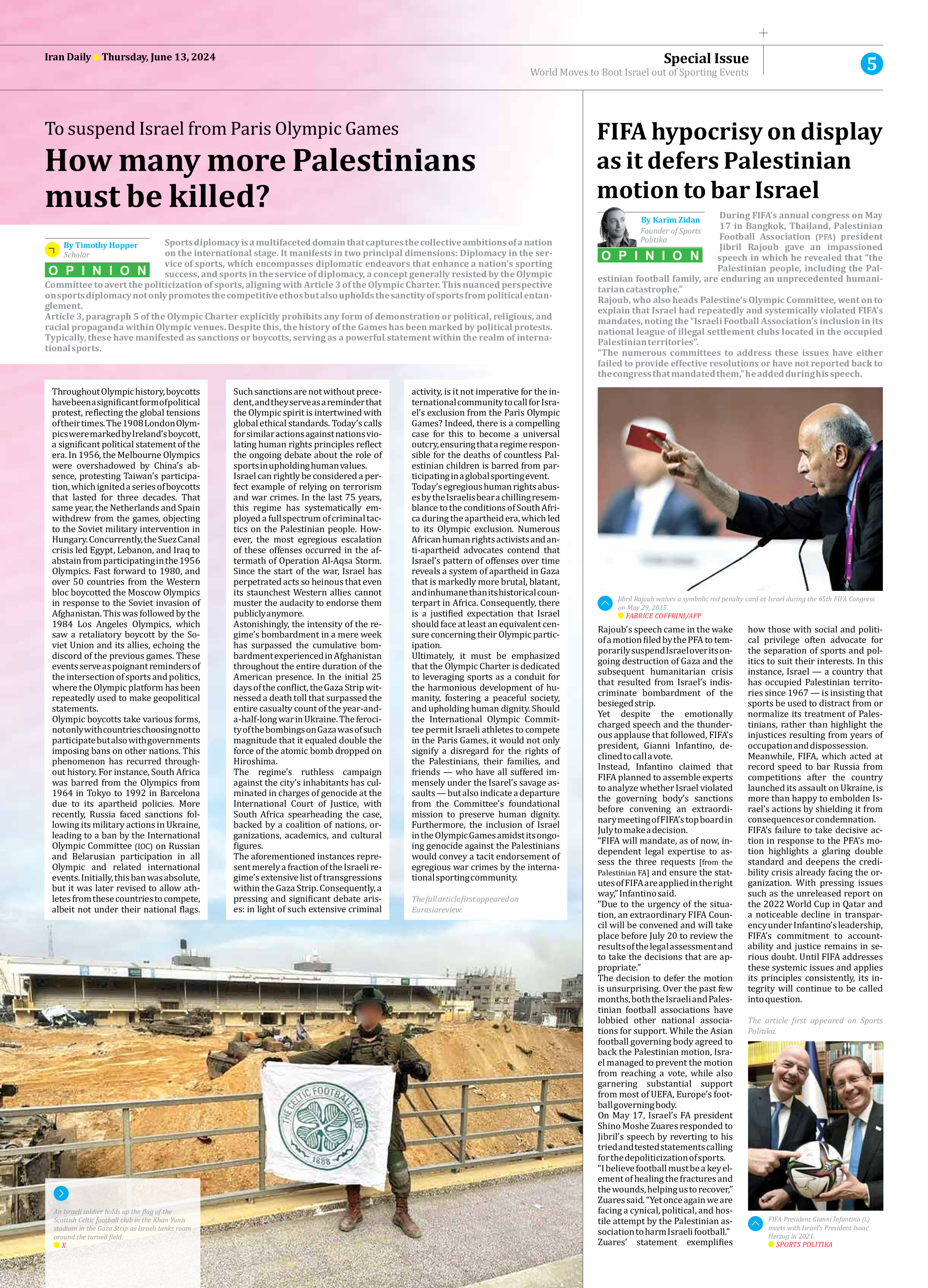
To suspend Israel from Paris Olympic Games
How many more Palestinians must be killed?
Sports diplomacy is a multifaceted domain that captures the collective ambitions of a nation on the international stage. It manifests in two principal dimensions: Diplomacy in the service of sports, which encompasses diplomatic endeavors that enhance a nation’s sporting success, and sports in the service of diplomacy, a concept generally resisted by the Olympic Committee to avert the politicization of sports, aligning with Article 3 of the Olympic Charter. This nuanced perspective on sports diplomacy not only promotes the competitive ethos but also upholds the sanctity of sports from political entanglement. Article 3, paragraph 5 of the Olympic Charter explicitly prohibits any form of demonstration or political, religious, and racial propaganda within Olympic venues. Despite this, the history of the Games has been marked by political protests. Typically, these have manifested as sanctions or boycotts, serving as a powerful statement within the realm of international sports.
By Timothy Hopper
Scholar
Throughout Olympic history, boycotts have been a significant form of political protest, reflecting the global tensions of their times. The 1908 London Olympics were marked by Ireland’s boycott, a significant political statement of the era. In 1956, the Melbourne Olympics were overshadowed by China’s absence, protesting Taiwan’s participation, which ignited a series of boycotts that lasted for three decades. That same year, the Netherlands and Spain withdrew from the games, objecting to the Soviet military intervention in Hungary. Concurrently, the Suez Canal crisis led Egypt, Lebanon, and Iraq to abstain from participating in the 1956 Olympics. Fast forward to 1980, and over 50 countries from the Western bloc boycotted the Moscow Olympics in response to the Soviet invasion of Afghanistan. This was followed by the 1984 Los Angeles Olympics, which saw a retaliatory boycott by the Soviet Union and its allies, echoing the discord of the previous games. These events serve as poignant reminders of the intersection of sports and politics, where the Olympic platform has been repeatedly used to make geopolitical statements.
Olympic boycotts take various forms, not only with countries choosing not to participate but also with governments imposing bans on other nations. This phenomenon has recurred throughout history. For instance, South Africa was barred from the Olympics from 1964 in Tokyo to 1992 in Barcelona due to its apartheid policies. More recently, Russia faced sanctions following its military actions in Ukraine, leading to a ban by the International Olympic Committee (IOC) on Russian and Belarusian participation in all Olympic and related international events. Initially, this ban was absolute, but it was later revised to allow athletes from these countries to compete, albeit not under their national flags. Such sanctions are not without precedent, and they serve as a reminder that the Olympic spirit is intertwined with global ethical standards. Today’s calls for similar actions against nations violating human rights principles reflect the ongoing debate about the role of sports in upholding human values.
Israel can rightly be considered a perfect example of relying on terrorism and war crimes. In the last 75 years, this regime has systematically employed a full spectrum of criminal tactics on the Palestinian people. However, the most egregious escalation of these offenses occurred in the aftermath of Operation Al-Aqsa Storm. Since the start of the war, Israel has perpetrated acts so heinous that even its staunchest Western allies cannot muster the audacity to endorse them publicly anymore.
Astonishingly, the intensity of the regime’s bombardment in a mere week has surpassed the cumulative bombardment experienced in Afghanistan throughout the entire duration of the American presence. In the initial 25 days of the conflict, the Gaza Strip witnessed a death toll that surpassed the entire casualty count of the year-and-a-half-long war in Ukraine. The ferocity of the bombings on Gaza was of such magnitude that it equaled double the force of the atomic bomb dropped on Hiroshima.
The regime’s ruthless campaign against the city’s inhabitants has culminated in charges of genocide at the International Court of Justice, with South Africa spearheading the case, backed by a coalition of nations, organizations, academics, and cultural figures.
The aforementioned instances represent merely a fraction of the Israeli regime’s extensive list of transgressions within the Gaza Strip. Consequently, a pressing and significant debate arises: in light of such extensive criminal activity, is it not imperative for the international community to call for Israel’s exclusion from the Paris Olympic Games? Indeed, there is a compelling case for this to become a universal outcry, ensuring that a regime responsible for the deaths of countless Palestinian children is barred from participating in a global sporting event.
Today’s egregious human rights abuses by the Israelis bear a chilling resemblance to the conditions of South Africa during the apartheid era, which led to its Olympic exclusion. Numerous African human rights activists and anti-apartheid advocates contend that Israel’s pattern of offenses over time reveals a system of apartheid in Gaza that is markedly more brutal, blatant, and inhumane than its historical counterpart in Africa. Consequently, there is a justified expectation that Israel should face at least an equivalent censure concerning their Olympic participation.
Ultimately, it must be emphasized that the Olympic Charter is dedicated to leveraging sports as a conduit for the harmonious development of humanity, fostering a peaceful society, and upholding human dignity. Should the International Olympic Committee permit Israeli athletes to compete in the Paris Games, it would not only signify a disregard for the rights of the Palestinians, their families, and friends — who have all suffered immensely under the Isarel’s savage assaults — but also indicate a departure from the Committee’s foundational mission to preserve human dignity. Furthermore, the inclusion of Israel in the Olympic Games amidst its ongoing genocide against the Palestinians would convey a tacit endorsement of egregious war crimes by the international sporting community.
The full article first appeared on Eurasiareview.







